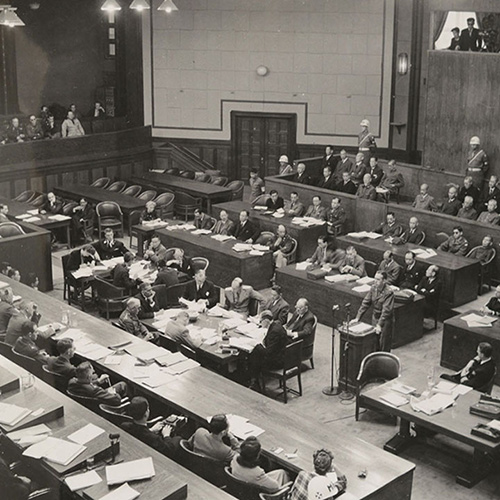
Defense counsel addresses the court at the International Military Tribunal in Tokyo, 1946 (US Army photo)
In 1945, Nazi officials involved in heinous crimes committed during the Holocaust of World War II and Japanese leaders responsible for war crimes including aggressive war, mass murder and torture, were indicted by International Military Tribunals in Nuremberg and Tokyo. The principal trials were conducted by a four-state tribunal in Germany, and by many more states in Japan. Together with subsidiary trials by national tribunals, these proceedings set new standards for war crimes and crimes against humanity leading to the creation of the International Criminal Court.
The story of how the tribunals were developed, how their rules were negotiated, and the different ways those rules were applied, is one of intrigue and suspense. President Franklin D. Roosevelt personally ordered the creation of rules in the American trial of German spies and saboteurs. His personal representative to the London Conference, which created the rules for postwar trials, informed the president that he had “sold them” to the other participants without informing them of all their implications.
Whether the trials would be fair depended largely upon the attitude of the judges, prosecutors, and notably, of who was in command. There were sharp differences in the political and military approaches of Generals Eisenhower in Europe and MacArthur in the Pacific. As a result, the proceedings sometimes ended with agonizingly fair results and even complete acquittals of defendants—and other trials were hardly fair at all.
Decades later, the trial rules from 1946 still echoed. They were copied in 2001 as the initial evidence rules for prisoners at Guantanamo Bay Naval Base, and as recently as January 2024, the Israeli Knesset was legislating procedures for dealing with unlawful enemy combatants.
Evan Wallach, a judge in the U.S. Court of Appeals for the Federal Circuit and one of the nation's foremost experts on war crimes and the law of war, explores the history of these trials and their impact on the world.
General Information